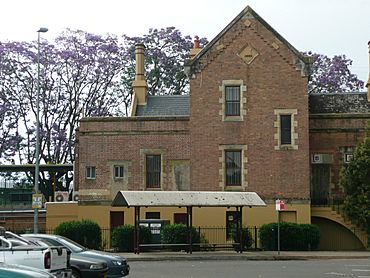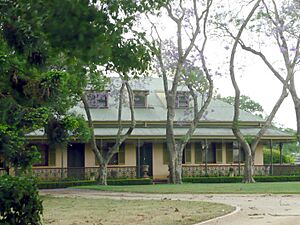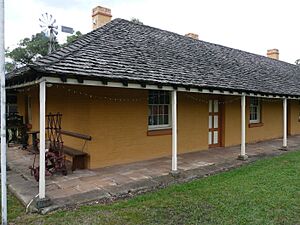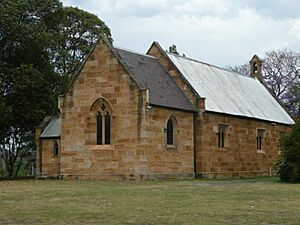Emu Plains facts for kids
Quick facts for kids Emu PlainsSydney, New South Wales |
|||||||||||||||
|---|---|---|---|---|---|---|---|---|---|---|---|---|---|---|---|

Emu Plains Railway Station
|
|||||||||||||||
| Population | 8,126 (2021 census) | ||||||||||||||
| • Density | 1,026.0/km2 (2,657/sq mi) | ||||||||||||||
| Established | 1814 | ||||||||||||||
| Postcode(s) | 2750 | ||||||||||||||
| Elevation | 27 m (89 ft) | ||||||||||||||
| Area | 7.92 km2 (3.1 sq mi) | ||||||||||||||
| Location |
|
||||||||||||||
| LGA(s) | City of Penrith | ||||||||||||||
| State electorate(s) | Penrith | ||||||||||||||
| Federal Division(s) | Lindsay | ||||||||||||||
|
|||||||||||||||
Emu Plains is a suburb located in Sydney, New South Wales, Australia. It's about 58 kilometers (36 miles) west of the main city area of Sydney. This suburb is part of the City of Penrith and the wider Greater Western Sydney region.
Emu Plains sits on the western side of the Nepean River. It is right at the base of the beautiful Blue Mountains.
Contents
History of Emu Plains
First Peoples of the Land
Before European settlers arrived, the area now known as Emu Plains was home to Aboriginal people. It was on the edge of the lands of the Dharug people from Western Sydney and the Gandangara people from the Southern Highlands. The local Dharug group was called the Mulgoa.
They lived by hunting and gathering food. Their lives followed traditional laws based on the Dreamtime. They built huts from bark called 'gunyahs'. They hunted animals like kangaroos and emus for food. They also gathered plants such as yams and berries.
European Settlement and Growth
The first British explorers visited Emu Plains in August 1790. They were led by Watkin Tench. They first called it Emu Island because they saw many emus there. They thought it was an island because the river sometimes flooded, making it look like one.
Governor Lachlan Macquarie visited the area on April 15, 1814. He realized it was not an island and was the first to use the name Emu Plains.
A road over the Blue Mountains began construction from Emu Plains. William Cox started building this important road on July 18, 1814.
A government farm was set up in 1813. It used 1,326 convicts to grow crops. This farm closed in 1833. The land was then sold to create the village of Emu Plains.
The Emu Ferry Post Office opened on April 1, 1863. It was later renamed Emu Plains in 1882.
In the 1880s, a company started taking stones from the Nepean River. These stones were used to make concrete and road foundations. A railway line was built in 1884 to help move these materials. Railway operations continued until 1967, and all railway work stopped in 1993.
Landmark Buildings in Emu Plains
Emu Plains has several important old buildings:
- The railway station is a special building made of brick and sandstone. It was built in 1883 and has two stories, which is unusual for a station. It is listed as a heritage site.
- Emu Hall is a large house near the Nepean River. Toby Ryan built it in 1851. It is also listed as a heritage site.
- St Paul's Anglican Church was built in 1848 and has a cemetery next to it.
- The former Arms of Australia Inn was built in 1833. It served travelers on the roads. The Nepean District Historical Society has restored it, and it is now a museum. It is a heritage-listed building.
- The original Emu Plains post office is a sandstone cottage. It is located at the corner of Russell Street and the Great Western Highway.
Shopping and Businesses
The main shopping area in Emu Plains is Lennox Village. It is named after David Lennox. This shopping center has major supermarkets like Aldi and Woolworths.
There is also a concrete plant in the industrial area of town. This plant is owned by Holcim Australia. It provides concrete to the western suburbs of Sydney six days a week.
Getting Around Emu Plains
Train Services
Emu Plains railway station is on the Main Western railway line. It is the last station on the local train line. The next station, Lapstone, is part of the intercity network that goes to the Blue Mountains. Even though it's far from Sydney city, many express trains run from Emu Plains to the city.
Bus and Road Access
Buses also serve Emu Plains. You can find their routes and times on the Blue Mountains Transit website.
Emu Plains is easy to reach by car. From Penrith, you can use the Great Western Highway. If you are coming from further east, the M4 Western Motorway is the best way. When traveling east from the Blue Mountains, the Great Western Highway is the main road.
Schools in Emu Plains
Emu Plains has several schools for students:
- Emu Plains Public School is a local government primary school.
- The Nepean Creative and Performing Arts High School is a government high school.
- Our Lady of the Way is a Catholic primary school.
- Penola Catholic College is a Catholic high school.
Things to See and Do
Emu Plains is the westernmost suburb in Greater Western Sydney. It offers a quieter lifestyle away from the busy city. It is also known as the main entry point to the beautiful Blue Mountains. The area has scenic views and several old colonial-era buildings to explore.
Art and Culture
The Penrith Regional Gallery & The Lewers Bequest is an art gallery located at 86 River Road, Emu Plains. It was once the home and studio of artists Gerald and Margo Lewers. The Lewers bought the property in the 1940s and lived there permanently from 1950.
After Margo Lewers passed away in 1978, her daughters donated the property to Penrith City Council. This included the buildings, gardens, and a large collection of art. The gallery opened in August 1981. Many thousands of people visit the gallery's exhibitions, gardens, and café each year.
Heritage Sites
Emu Plains has several places that are listed for their historical importance:
- Main Western railway: Emu Plains railway station
- Arms of Australia Inn (built in 1826)
- St Paul's Anglican Church (built in 1848)
- Police Cottage (built in 1908)
Churches in Emu Plains
- St Paul's Church School opened in 1848. The church building was officially opened in 1872. It is now part of the Emu Plains Anglican Church.
- Our Lady of the Way is part of the Catholic Diocese of Parramatta. The church and school buildings were built around 1860 on land given by the government.
- Emu Plains Community Baptist Church started in August 2001. They first held services in the Emu Plains Community Centre. In 2005, they moved to Melrose Hall.
Population of Emu Plains
In 2021, there were 8,126 people living in Emu Plains. About 4.0% of the population were Aboriginal and Torres Strait Islander people. Most residents, 81.3%, were born in Australia. Other common birthplaces included England (4.5%) and New Zealand (1.6%).
For religious beliefs, the top responses were No Religion (31.7%), Catholic (26.8%), and Anglican (19.2%). The most common ancestries were Australian (41.6%) and English (40.0%). Most people (89.0%) spoke only English at home.
Famous People from Emu Plains
Some notable people have lived in or are connected to Emu Plains:
- Edwin Evans (1849–1921), an Australian cricketer.
- William Carter (1902–1952), an Australian silent film actor.
- Sir Francis Forbes (1784–1841), who was the chief justice of New South Wales. He built a house called Edinglassie in Emu Plains.
- Gerald Lewers (1905–1962) and Margo Lewers (1908–1978), artists who donated their home to become the Penrith Regional Art Gallery.
- Toby Ryan (1818–1899), an early landholder, sportsman, and politician.
Local Government
Until 1963, Emu Plains was part of the Blue Mountains City Council. It then became part of the Penrith City Council, which it is still part of today. The suburb is split between the North and South Wards for local council elections.
At the state level, Emu Plains is in the Electoral district of Penrith. This area is currently represented by Karen McKeown from the Australian Labor Party. For federal elections, Emu Plains is part of the Division of Lindsay. This area is represented by Melissa McIntosh from the Liberal Party.
 | Stephanie Wilson |
 | Charles Bolden |
 | Ronald McNair |
 | Frederick D. Gregory |




